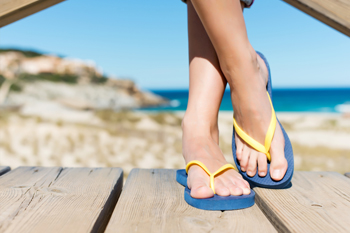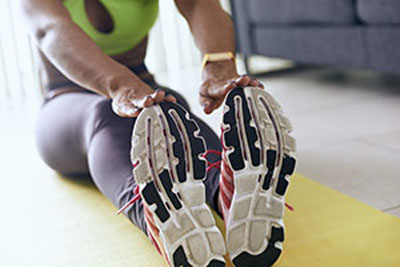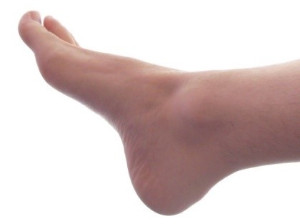Blog
What Type of Foot Conditions Can Result From Wearing Flip Flops?
 Flip flops are a popular type of shoe that is worn in the summer months. Despite the simplicity of wearing these types of shoes, it is thought that they may cause harm to the feet. The Achilles tendon may become sore as a result of the little or no arch support offered by flip flops. Some patients may notice blisters forming between the toes where the thong, which helps to keep the shoe on the foot, rubs against the skin. People who decide to wear flip flops may benefit from choosing shoes that are designed with supportive materials, as this may help to reduce the risk of getting blisters and calluses. If you would like additional information about what type of flip flops to purchase, please consult with a podiatrist.
Flip flops are a popular type of shoe that is worn in the summer months. Despite the simplicity of wearing these types of shoes, it is thought that they may cause harm to the feet. The Achilles tendon may become sore as a result of the little or no arch support offered by flip flops. Some patients may notice blisters forming between the toes where the thong, which helps to keep the shoe on the foot, rubs against the skin. People who decide to wear flip flops may benefit from choosing shoes that are designed with supportive materials, as this may help to reduce the risk of getting blisters and calluses. If you would like additional information about what type of flip flops to purchase, please consult with a podiatrist.
Flip-flops can cause a lot of problems for your feet. If you have any concerns about your feet or ankles, contact one of our podiatrists from Pennsylvania. Our doctors will assist you with all of your foot and ankle needs.
Flip-Flops and Feet
Flip-flops have managed to become a summer essential for a lot of people. While the shoes may be stylish and easy to slip on and off, they can be dangerous to those who wear them too often. These shoes might protect you from fungal infections such as athlete’s foot, but they can also give you foot pain and sprained ankles if you trip while wearing them.
When Are They Okay to Wear?
Flip-flops should only be worn for very short periods of time. They can help protect your feet in places that are crawling with fungi, such as gym locker rooms. Athlete’s foot and plantar warts are two common fungi that flip-flops may help protect your feet against.
Why Are They Bad for My Feet?
These shoes do not offer any arch support, so they are not ideal for everyday use. They also do not provide shock absorption or heel cushioning which can be problematic for your feet. Additionally, you may suffer from glass cuts, puncture wounds, and stubbed toes since they offer little protection for your feet.
More Reasons Why They Are Bad for Your Feet
- They Slow You Down
- May Cause Blisters and Calluses
- Expose Your Feet to Bacteria
If you have any questions, please feel free to contact one of our offices located in Plymouth Meeting and Ambler, PA . We offer the newest diagnostic and treatment technologies for all your foot care needs.
Symptoms and Causes of Cracked Heels
 The medical condition that is known as cracked heels can develop for a variety of reasons. These can include walking barefoot, standing for extended periods of time throughout the day, or from wearing shoes that have an open back. Additionally, there are medical causes that may significantly contribute to the onset of cracked heels. These can consist of vitamin deficiencies, thyroid disorder, and psoriasis. The symptoms that are often associated with this ailment are pain, red skin, itchiness and inflammation. If you have developed cracked heels, it is suggested that you confer with a podiatrist who can recommend treatment techniques.
The medical condition that is known as cracked heels can develop for a variety of reasons. These can include walking barefoot, standing for extended periods of time throughout the day, or from wearing shoes that have an open back. Additionally, there are medical causes that may significantly contribute to the onset of cracked heels. These can consist of vitamin deficiencies, thyroid disorder, and psoriasis. The symptoms that are often associated with this ailment are pain, red skin, itchiness and inflammation. If you have developed cracked heels, it is suggested that you confer with a podiatrist who can recommend treatment techniques.
If the skin on your feet starts to crack, you may want to see a podiatrist to find treatment. If you have any concerns, contact one of our podiatrists from Pennsylvania. Our doctors can provide the care you need to keep you pain-free and on your feet.
Cracked Heels
It is important to moisturize your cracked heels in order to prevent pain, bleeding, and infection. The reason cracked heels form is because the skin on the foot is too dry to support the immense pressure placed on them. When the foot expands, the dry skin on the foot begins to split.
Ways to Help Heal Them
- Invest in a good foot cream
- Try Using Petroleum Jelly
- Ease up on Soaps
- Drink Plenty of Water
Ways to Prevent Cracked Heels
- Moisturize After Showering
- Skip a Shower
- Keep Shower Water Lukewarm
- Don’t Scrub Your Feet
If you are unsure how to proceed in treating cracked heels, seek guidance from a podiatrist. Your doctor will help you with any questions or information you may need.
If you have any questions, please feel free to contact one of our offices located in Plymouth Meeting and Ambler, PA . We offer the newest diagnostic and treatment technologies for all your foot care needs.
Plantar Hyperhidrosis May Increase the Risk of Other Foot Conditions
 Patients who have excessively sweaty feet may experience a condition that is referred to as plantar hyperhidrosis. This ailment can occur as a result of overactive sweat glands which produce sweat when cooling the body is not necessary. Plantar hyperhidrosis may increase the risk for other foot conditions to develop, including athlete’s foot, warts, and corns. Additionally, shoes may fall off of your feet due to the excess sweat making them slippery, and there may be a strong odor that comes from the feet and shoes. If you are afflicted with plantar hyperhidrosis, it is suggested that you speak with a podiatrist who can determine what the best treatment is for you.
Patients who have excessively sweaty feet may experience a condition that is referred to as plantar hyperhidrosis. This ailment can occur as a result of overactive sweat glands which produce sweat when cooling the body is not necessary. Plantar hyperhidrosis may increase the risk for other foot conditions to develop, including athlete’s foot, warts, and corns. Additionally, shoes may fall off of your feet due to the excess sweat making them slippery, and there may be a strong odor that comes from the feet and shoes. If you are afflicted with plantar hyperhidrosis, it is suggested that you speak with a podiatrist who can determine what the best treatment is for you.
If you are suffering from hyperhidrosis contact one of our podiatrists of Pennsylvania. Our doctors can provide the care you need to attend to all of your foot and ankle needs.
Hyperhidrosis of the Feet
Hyperhidrosis is a rare disorder that can cause people to have excessive sweating of their feet. This can usually occur all on its own without rigorous activity involved. People who suffer from hyperhidrosis may also experience sweaty palms.
Although it is said that sweating is a healthy process meant to cool down the body temperature and to maintain a proper internal temperature, hyperhidrosis may prove to be a huge hindrance on a person’s everyday life.
Plantar hyperhidrosis is considered to be the main form of hyperhidrosis. Secondary hyperhidrosis can refer to sweating that occurs in areas other than the feet or hands and armpits. Often this may be a sign of it being related to another medical condition such as menopause, hyperthyroidism and even Parkinson’s disease.
In order to alleviate this condition, it is important to see your doctor so that they may prescribe the necessary medications so that you can begin to live a normal life again. If this is left untreated, it is said that it will persist throughout an individual’s life.
A last resort approach would be surgery, but it is best to speak with your doctor to find out what may be the best treatment for you.
If you have any questions please feel free to contact one of our offices located in Plymouth Meeting and Ambler, PA . We offer the newest diagnostic and treatment technologies for all your foot and ankle needs.

